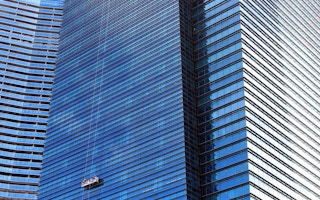Singapore’s Building and Construction Authority (BCA) on Wednesday unveiled a new software tool that will help building managers and owners make chiller plants more energy efficient.
Developed in partnership with American software giant Microsoft, the tool—known as the Chiller Efficiency Smart Portal—will use cutting-edge internet of things technology such as data analytics and cloud computing to monitor chiller performance and provide building owners with insights that can help them save energy.
The pilot project is powered by Microsoft Azure, a cloud computing platform, and will cater to 30 commercial and institutional buildings in Singapore over the next two years.
Unveiled at the sidelines of the International Green Building Conference (IGBC) 2016 held at Singapore’s Sands Expo and Convention Centre, the portal is also the first effort by a government agency to implement an internet of things solution for chiller plant efficiency.
Chiller plants, the machines that help keep rooms cool, are a permanent fixture in tropical Singapore, but they are massive energy consumers. In Singapore, they make up half the energy consumption of a building; buildings in turn account for a third of the nation’s electricity use.
“Optimising chiller plant efficiency is therefore key to reducing the impact of buildings on their environment”, said the agency.
Ang Kian Seng, group director of BCA’s environmental sustainability group, added in a statement that “this Chiller Efficiency Smart Portal will empower facilities managers to target specific areas of improvement and optimise their energy efficiency”.
The system monitors chiller plant performance, and uploads data about the plant’s power use, water flow rate, temperature, and other performance indicators to the portal, which is hosted on the Azure cloud platform.
Over time, the portal can learn a chiller’s normal usage patterns, and detect deviations which may indicate that energy is being wasted. It then sends a text message or e-mail alerting building managers of an irregularity, so that they can fine-tune the equipment’s performance and save energy.
Over time, owners can also compare energy use trends across various buildings in their portfolio.

A screenshot of the Chiller Efficiency Smart Portal. Image: BCA/Microsoft
Examples of decisions the portal will facilitate include when to schedule equipment maintenance, or what performance standards to expect from contractors who service the chiller plant.
Kenny Low, senior facilities supervisor at United World College of Southeast Asia—a school with multiple campuses in the east and west of Singapore—observed that in addition to monitoring chiller plant performance, the portal also offers analysis and graphing tools for building owner to download and understand data conveniently.
“I foresee enthusiastic uptake of this portal and hope that all users will turn the insights it provides into actions to optimise their chiller plant,” he added.
BCA also noted that when the two-year pilot ends, the portal could potentially be incorporated into its Green Mark certification scheme, which scores buildings based on their environmental performance. The agency hopes to have 80 per cent of all buildings in Singapore Green Mark certified by 2030.
The portal could encourage buildings to constantly improve efficiency, and seek re-certification regularly, said BCA.
Foo Jong Tong, public sector director, Microsoft Singapore, noted that the digital capabilities of its cloud software will be essential to improve the energy efficiency of buildings and help BCA meet its goal.
He added: “This digital transformation will not only strengthen BCA’s push towards becoming a global leader in green buildings, it is also a significant step towards building a better and more sustainable future for the people in Singapore”.
IGBC 2016 attendees and visitors to the Build Eco Xpo (BEX) Asia exhibition at the Sands Expo and Convention Centre can view the Chiller Efficiency Smart Portal from September 7 to 9.
Eco-Business is producing a special e-newsletter featuring stories on the proceedings at IGBC 2016, kindly supported by City Developments Ltd and the Building and Construction Authority. Sign up to receive the newsletter here.






















